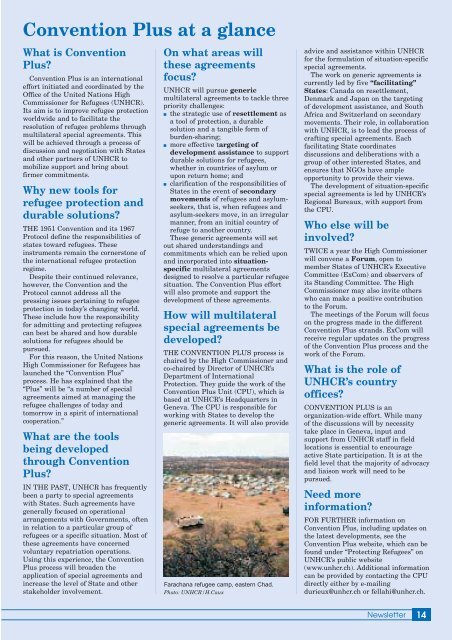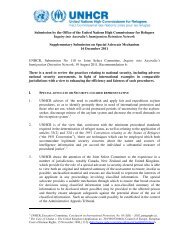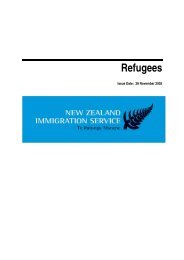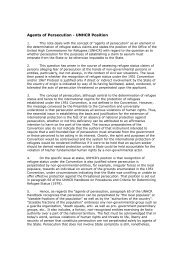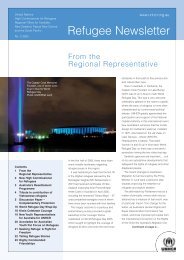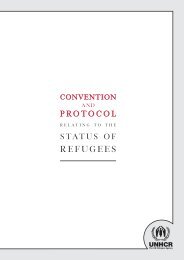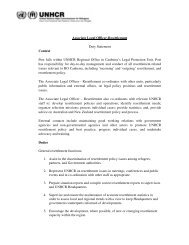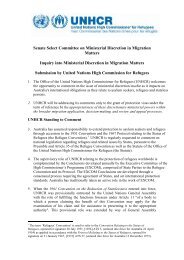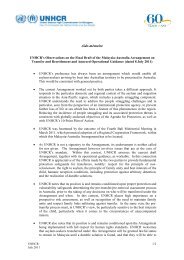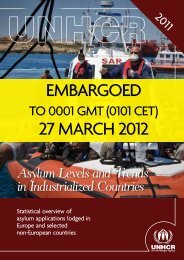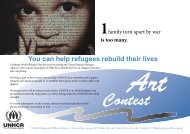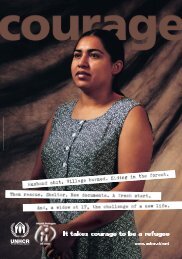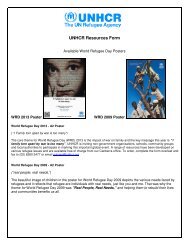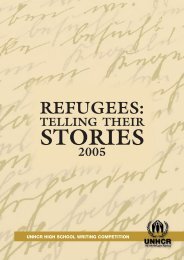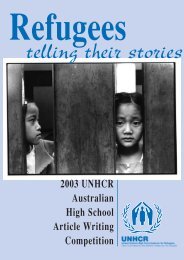download newsletter - unhcr
download newsletter - unhcr
download newsletter - unhcr
You also want an ePaper? Increase the reach of your titles
YUMPU automatically turns print PDFs into web optimized ePapers that Google loves.
Convention Plus at a glance<br />
What is Convention<br />
Plus?<br />
Convention Plus is an international<br />
effort initiated and coordinated by the<br />
Office of the United Nations High<br />
Commissioner for Refugees (UNHCR).<br />
Its aim is to improve refugee protection<br />
worldwide and to facilitate the<br />
resolution of refugee problems through<br />
multilateral special agreements. This<br />
will be achieved through a process of<br />
discussion and negotiation with States<br />
and other partners of UNHCR to<br />
mobilize support and bring about<br />
firmer commitments.<br />
Why new tools for<br />
refugee protection and<br />
durable solutions?<br />
THE 1951 Convention and its 1967<br />
Protocol define the responsibilities of<br />
states toward refugees. These<br />
instruments remain the cornerstone of<br />
the international refugee protection<br />
regime.<br />
Despite their continued relevance,<br />
however, the Convention and the<br />
Protocol cannot address all the<br />
pressing issues pertaining to refugee<br />
protection in today’s changing world.<br />
These include how the responsibility<br />
for admitting and protecting refugees<br />
can best be shared and how durable<br />
solutions for refugees should be<br />
pursued.<br />
For this reason, the United Nations<br />
High Commissioner for Refugees has<br />
launched the “Convention Plus”<br />
process. He has explained that the<br />
“Plus” will be “a number of special<br />
agreements aimed at managing the<br />
refugee challenges of today and<br />
tomorrow in a spirit of international<br />
cooperation.”<br />
What are the tools<br />
being developed<br />
through Convention<br />
Plus?<br />
IN THE PAST, UNHCR has frequently<br />
been a party to special agreements<br />
with States. Such agreements have<br />
generally focused on operational<br />
arrangements with Governments, often<br />
in relation to a particular group of<br />
refugees or a specific situation. Most of<br />
these agreements have concerned<br />
voluntary repatriation operations.<br />
Using this experience, the Convention<br />
Plus process will broaden the<br />
application of special agreements and<br />
increase the level of State and other<br />
stakeholder involvement.<br />
On what areas will<br />
these agreements<br />
focus?<br />
UNHCR will pursue generic<br />
multilateral agreements to tackle three<br />
priority challenges:<br />
■ the strategic use of resettlement as<br />
a tool of protection, a durable<br />
solution and a tangible form of<br />
burden-sharing;<br />
■ more effective targeting of<br />
development assistance to support<br />
durable solutions for refugees,<br />
whether in countries of asylum or<br />
upon return home; and<br />
■<br />
clarification of the responsibilities of<br />
States in the event of secondary<br />
movements of refugees and asylumseekers,<br />
that is, when refugees and<br />
asylum-seekers move, in an irregular<br />
manner, from an initial country of<br />
refuge to another country.<br />
These generic agreements will set<br />
out shared understandings and<br />
commitments which can be relied upon<br />
and incorporated into situationspecific<br />
multilateral agreements<br />
designed to resolve a particular refugee<br />
situation. The Convention Plus effort<br />
will also promote and support the<br />
development of these agreements.<br />
How will multilateral<br />
special agreements be<br />
developed?<br />
THE CONVENTION PLUS process is<br />
chaired by the High Commissioner and<br />
co-chaired by Director of UNHCR’s<br />
Department of International<br />
Protection. They guide the work of the<br />
Convention Plus Unit (CPU), which is<br />
based at UNHCR’s Headquarters in<br />
Geneva. The CPU is responsible for<br />
working with States to develop the<br />
generic agreements. It will also provide<br />
Farachana refugee camp, eastern Chad.<br />
Photo: UNHCR/H.Caux<br />
advice and assistance within UNHCR<br />
for the formulation of situation-specific<br />
special agreements.<br />
The work on generic agreements is<br />
currently led by five “facilitating”<br />
States: Canada on resettlement,<br />
Denmark and Japan on the targeting<br />
of development assistance, and South<br />
Africa and Switzerland on secondary<br />
movements. Their role, in collaboration<br />
with UNHCR, is to lead the process of<br />
crafting special agreements. Each<br />
facilitating State coordinates<br />
discussions and deliberations with a<br />
group of other interested States, and<br />
ensures that NGOs have ample<br />
opportunity to provide their views.<br />
The development of situation-specific<br />
special agreements is led by UNHCR’s<br />
Regional Bureaux, with support from<br />
the CPU.<br />
Who else will be<br />
involved?<br />
TWICE a year the High Commissioner<br />
will convene a Forum, open to<br />
member States of UNHCR’s Executive<br />
Committee (ExCom) and observers of<br />
its Standing Committee. The High<br />
Commissioner may also invite others<br />
who can make a positive contribution<br />
to the Forum.<br />
The meetings of the Forum will focus<br />
on the progress made in the different<br />
Convention Plus strands. ExCom will<br />
receive regular updates on the progress<br />
of the Convention Plus process and the<br />
work of the Forum.<br />
What is the role of<br />
UNHCR’s country<br />
offices?<br />
CONVENTION PLUS is an<br />
organization-wide effort. While many<br />
of the discussions will by necessity<br />
take place in Geneva, input and<br />
support from UNHCR staff in field<br />
locations is essential to encourage<br />
active State participation. It is at the<br />
field level that the majority of advocacy<br />
and liaison work will need to be<br />
pursued.<br />
Need more<br />
information?<br />
FOR FURTHER information on<br />
Convention Plus, including updates on<br />
the latest developments, see the<br />
Convention Plus website, which can be<br />
found under “Protecting Refugees” on<br />
UNHCR’s public website<br />
(www.<strong>unhcr</strong>.ch). Additional information<br />
can be provided by contacting the CPU<br />
directly either by e-mailing<br />
durieux@<strong>unhcr</strong>.ch or fellahi@<strong>unhcr</strong>.ch.<br />
Newsletter<br />
14


